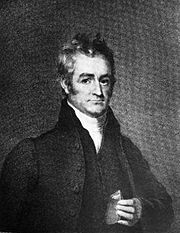
William Phillips (geologist)
Encyclopedia

England
England is a country that is part of the United Kingdom. It shares land borders with Scotland to the north and Wales to the west; the Irish Sea is to the north west, the Celtic Sea to the south west, with the North Sea to the east and the English Channel to the south separating it from continental...
mineralogist and geologist
Geologist
A geologist is a scientist who studies the solid and liquid matter that constitutes the Earth as well as the processes and history that has shaped it. Geologists usually engage in studying geology. Geologists, studying more of an applied science than a theoretical one, must approach Geology using...
.
Phillips was the son of James Phillips, printer and bookseller in London
London
London is the capital city of :England and the :United Kingdom, the largest metropolitan area in the United Kingdom, and the largest urban zone in the European Union by most measures. Located on the River Thames, London has been a major settlement for two millennia, its history going back to its...
. He became interested in mineralogy and geology, and was one of the founders of the Geological Society of London
Geological Society of London
The Geological Society of London is a learned society based in the United Kingdom with the aim of "investigating the mineral structure of the Earth"...
(1807). His Outlines of Mineralogy and Geology (1815) and Elementary Introduction to the Knowledge of Mineralogy (1816) became standard textbooks. His digest of English geology, A selection of Facts from the Best Authorities, arranged so as to form an Outline of the Geology of England and Wales (1818), formed the foundation of the larger work undertaken by Phillips in conjunction with William Conybeare, of which only the first part was published, entitled Outlines of the Geology of England and Wales (1822). This book had a major influence on the development of geology in Britain. In this work Phillips reprinted his description of the chalk cliffs of Dover and other parts of East Kent
Kent
Kent is a county in southeast England, and is one of the home counties. It borders East Sussex, Surrey and Greater London and has a defined boundary with Essex in the middle of the Thames Estuary. The ceremonial county boundaries of Kent include the shire county of Kent and the unitary borough of...
. Phillips was a member of the Religious Society of Friends
Religious Society of Friends
The Religious Society of Friends, or Friends Church, is a Christian movement which stresses the doctrine of the priesthood of all believers. Members are known as Friends, or popularly as Quakers. It is made of independent organisations, which have split from one another due to doctrinal differences...
. He was elected a Fellow of the Royal Society
Royal Society
The Royal Society of London for Improving Natural Knowledge, known simply as the Royal Society, is a learned society for science, and is possibly the oldest such society in existence. Founded in November 1660, it was granted a Royal Charter by King Charles II as the "Royal Society of London"...
in 1827.
In 1796 he and his brother Richard Phillips
Richard Phillips (chemist)
Richard Phillips , was distinguished as a British chemist, and became fellow of the Royal Society in 1822. He was born in Lombard Street, London on 21 November 1778, married Ann Rickman on 14 April 1807 and died 11 May 1851 in Camberwell, being buried in Norwood Cemetery...
, together with William Allen
William Allen (Quaker)
William Allen FRS, FLS was an English scientist and philanthropist who opposed slavery and engaged in schemes of social and penal improvement in early nineteenth century England.-Early life:...
and Luke Howard
Luke Howard
Luke Howard FRS was a British manufacturing chemist and an amateur meteorologist with broad interests in science...
, took part in forming the Askesian Society
Askesian Society
The Askesian Society was a debating club for scientific thinkers, established in 1796 in London. The name was taken from the Greek term Askesis, meaning 'training' or 'application'. It was founded by William Allen, who allowed the use of his laboratory at No...
.
The zeolite
Zeolite
Zeolites are microporous, aluminosilicate minerals commonly used as commercial adsorbents. The term zeolite was originally coined in 1756 by Swedish mineralogist Axel Fredrik Cronstedt, who observed that upon rapidly heating the material stilbite, it produced large amounts of steam from water that...
mineral phillipsite
Phillipsite
Phillipsite is a mineral of the zeolite group; a hydrated potassium, calcium and aluminium silicate, approximating to 3Al6Si10O32·12H2O. . The crystals are monoclinic, but only complex cruciform twins are known, these being exactly like twins of harmotome...
is named for him.
Further reading
- ODNB article by H. S. Torrens, ‘Phillips, William (1773–1828)’, Oxford Dictionary of National Biography, Oxford University Press, 2004; online edn, May 2006 accessed 27 Sept 2010

